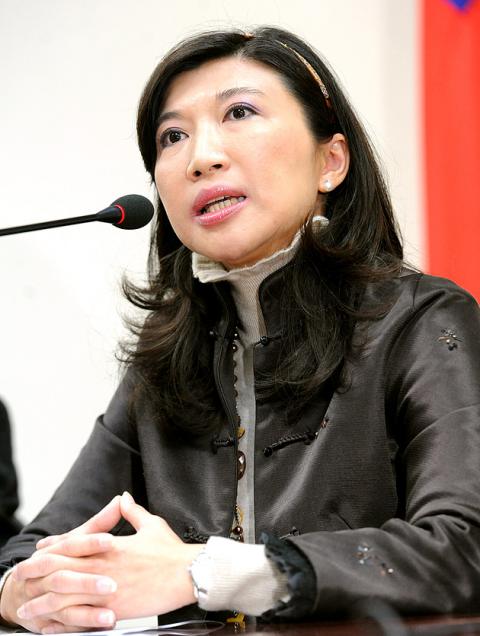The Chinese Nationalist Party (KMT) yesterday wrapped up legislative election nominee negotiations for one race in Taipei City, with KMT Taipei City Councilor Chen Yu-mei (陳玉梅) announcing her withdrawal from the primaries.
Chen said she decided to drop out of the race after a discussion with President Ma Ying-jeou (馬英九), who doubles as KMT chairman, and KMT Secretary-General Liao Liou-yi (廖了以) about polls that show she has a lower support rating than KMT Legislator Justin Chou (周守訓).
Chou will seek re-election in the Shilin (士林) and Datong (大同) electoral district.

Photo: Chang Chia-ming, Taipei Times
“Withdrawing from the race is a crucial decision to make,” she told a press conference at KMT headquarters. “The KMT cannot afford a split in the legislative and presidential elections and I will give the opportunity to Chou for the sake of party unity.”
Chen, who also serves as director of the KMT’s Women’s Affairs Committee, said she would focus her efforts on the presidential campaign, which is to start next month as the KMT plans to formally nominate Ma.
Director of the KMT’s Organization and Development Committee Huang Chao-yuan (黃昭元) thanked Chen for “taking the overall situation into consideration” and said the KMT was confident of Chou’s victory.
Of the other seven electoral districts in Taipei, Huang said the party would continue negotiations in Zhongshan (中山) and Songshan (松山) districts, as three hopefuls seek to represent the party — KMT Legislator Lo Shu-lei (羅淑蕾), KMT Legislator John Chiang (蔣孝嚴) and Taipei City Councilor Wang Hao (王浩).
The KMT said that it will complete the first phase of its nomination process on April 20 in 32 electoral districts that have only one registered contender, while the second and third phases of the nomination process will be completed on May 11 and May 25.
The KMT does not plan to hold primaries to choose candidates for the legislative elections, and will seek to complete all nominations via negotiation.

Alain Robert, known as the "French Spider-Man," praised Alex Honnold as exceptionally well-prepared after the US climber completed a free solo ascent of Taipei 101 yesterday. Robert said Honnold's ascent of the 508m-tall skyscraper in just more than one-and-a-half hours without using safety ropes or equipment was a remarkable achievement. "This is my life," he said in an interview conducted in French, adding that he liked the feeling of being "on the edge of danger." The 63-year-old Frenchman climbed Taipei 101 using ropes in December 2004, taking about four hours to reach the top. On a one-to-10 scale of difficulty, Robert said Taipei 101

Nipah virus infection is to be officially listed as a category 5 notifiable infectious disease in Taiwan in March, while clinical treatment guidelines are being formulated, the Centers for Disease Control (CDC) said yesterday. With Nipah infections being reported in other countries and considering its relatively high fatality rate, the centers on Jan. 16 announced that it would be listed as a notifiable infectious disease to bolster the nation’s systematic early warning system and increase public awareness, the CDC said. Bangladesh reported four fatal cases last year in separate districts, with three linked to raw date palm sap consumption, CDC Epidemic Intelligence

Two Taiwanese prosecutors were questioned by Chinese security personnel at their hotel during a trip to China’s Henan Province this month, the Mainland Affairs Council (MAC) said yesterday. The officers had personal information on the prosecutors, including “when they were assigned to their posts, their work locations and job titles,” MAC Deputy Minister and spokesman Liang Wen-chieh (梁文傑) said. On top of asking about their agencies and positions, the officers also questioned the prosecutors about the Cross-Strait Joint Crime-Fighting and Judicial Mutual Assistance Agreement, a pact that serves as the framework for Taiwan-China cooperation on combating crime and providing judicial assistance, Liang

US climber Alex Honnold left Taiwan this morning a day after completing a free-solo ascent of Taipei 101, a feat that drew cheers from onlookers and gained widespread international attention. Honnold yesterday scaled the 101-story skyscraper without a rope or safety harness. The climb — the highest urban free-solo ascent ever attempted — took just more than 90 minutes and was streamed live on Netflix. It was covered by major international news outlets including CNN, the New York Times, the Guardian and the Wall Street Journal. As Honnold prepared to leave Taiwan today, he attracted a crowd when he and his wife, Sanni,